Health
Mak School of Public Health, Ministry of Health to Conduct National Mental Health Integration Study
Published
3 years agoon
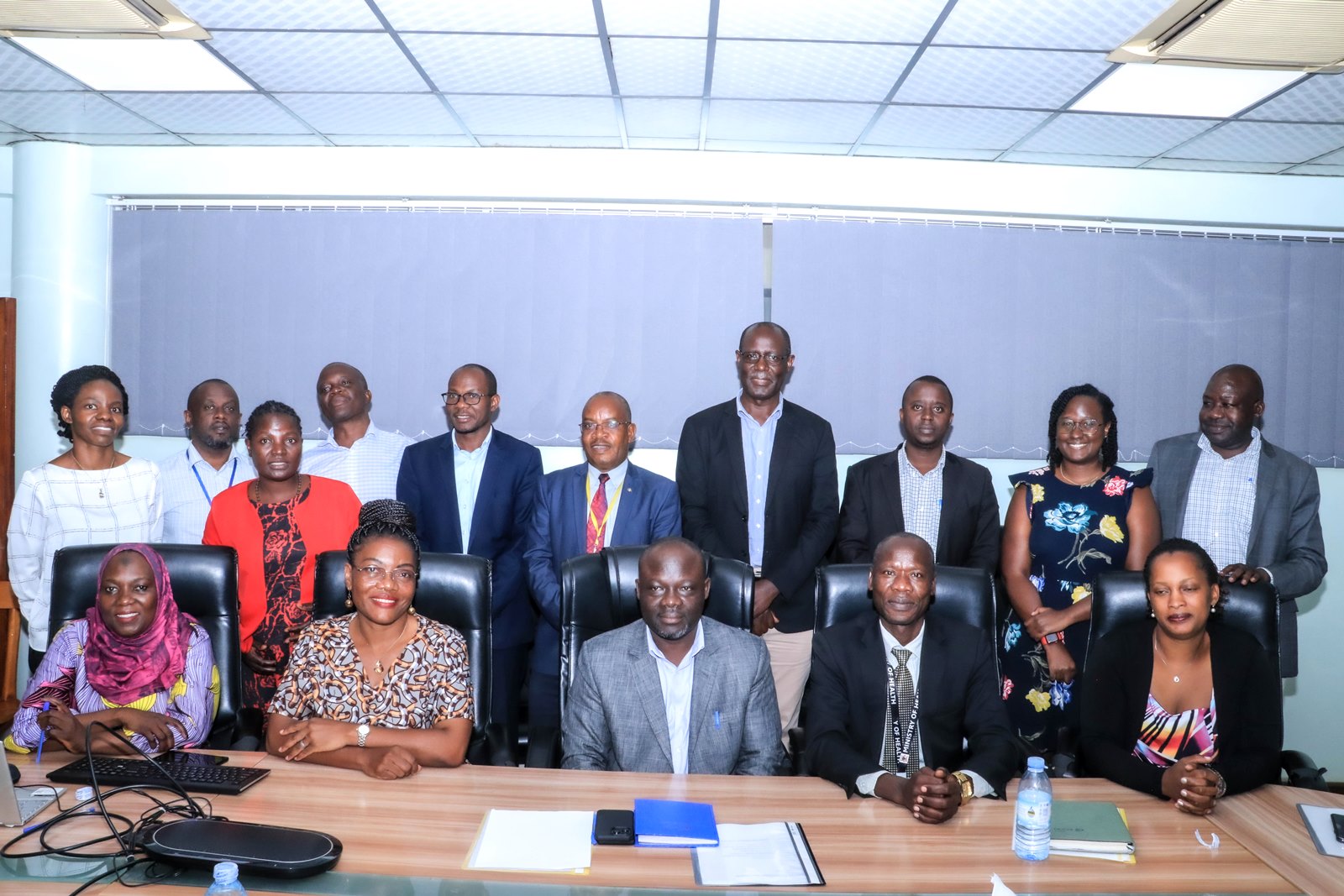
As mental health gains recognition as a critical aspect of overall well-being, a pioneering study is set to delve into its integration in schools, communities and healthcare units across Uganda.
With funding from the World Bank, this landmark study titled; “Assessing the Extent of Integration of Mental Health Services into Primary Healthcare, Community and Schools” will focus on four purposively selected districts in Uganda – Adjumani in the Northern region, Bushenyi in Western Uganda, Kapchorwa in Eastern Uganda, and Butambala in Central Uganda.
With the potential to revolutionize mental health practices in schools, this study will through rigorous research and analysis shed light on the implementation and impact of mental health integration initiatives in schools, uncovering new insights that could shape policies and practices for generations to come.
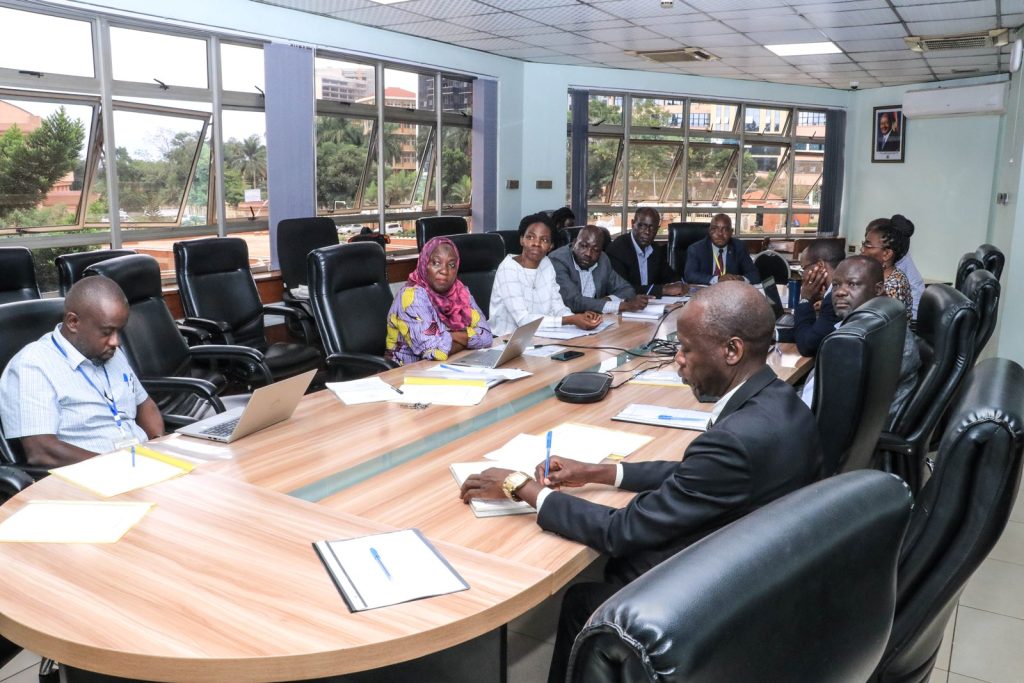
Latest data from the international Burden of Disease Study indicates that mental illness and substance use disorders account for 3.35% of the total disease burden in Uganda. According to the latest WHO data, at least 7.4% of Ugandans are affected by common mental disorders particularly depression, anxiety and alcohol use disorders.
Comparable to high-income countries, depression and generalized anxiety disorders in Uganda, are prevalent at 5.3% and 4.1% respectively. Uganda ranks among the top five countries globally with the highest depression prevalence. Poverty, HIV infection, disasters, and adverse environmental conditions are factors that increase the risk and consequence of mental health conditions in Uganda.
It is against this background that the World Bank Group solicited for consultancy services for a nation-wide study to assess the extent of integration of mental health services into primary healthcare, schools and communities.
Dr. Juliet Nakku, Senior Consultant Psychiatrist and Executive Director of Butabika National Referral Mental Hospital, during an inception meeting of mental health stakeholders on April 13, stated that the study will reveal the prevalence and types of mental health issues in these settings and their impact on community well-being.
This study that will be conducted by a team of mental health experts from the Ministry of Health and Makerere University School of Public Health. This study will assess the availability, access, and quality of mental health services in PHC, communities, and schools.
The study’s Principal Investigator Dr. Nakku further emphasized that the research will assess existing services, identify gaps/barriers, and explore opportunities/challenges in integrating mental health into primary healthcare and schools. This will involve examining policies, resources, support systems, and obstacles to integration.
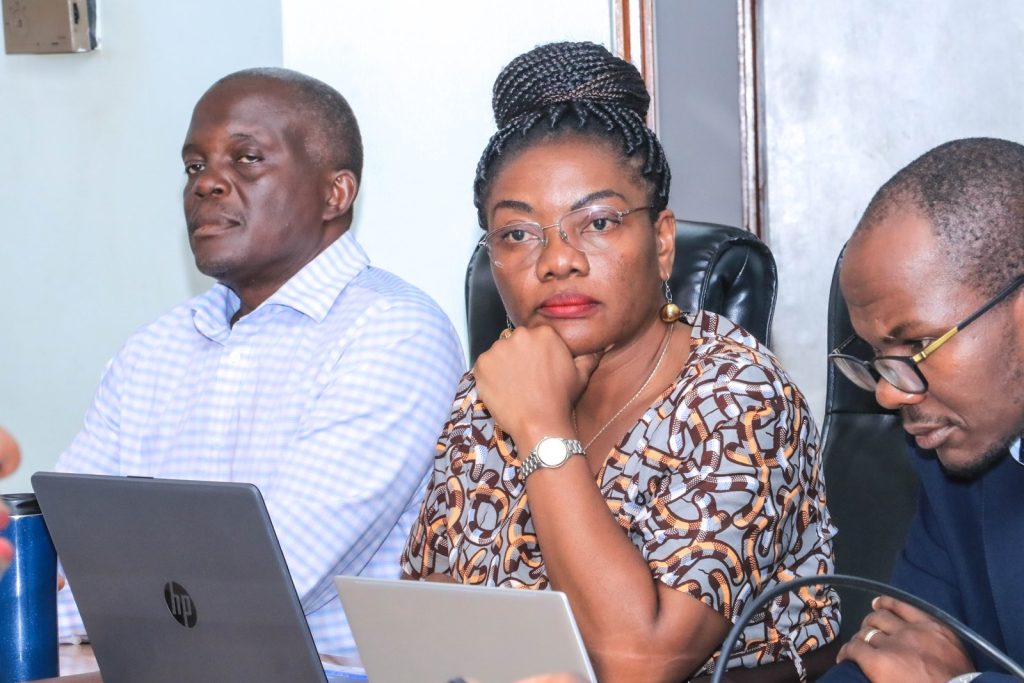
Over the last 20 years, Uganda has taken measures to enhance its healthcare system and promote better health outcomes for its population. In 1996, the government-initiated efforts to integrate mental health into primary healthcare, providing training for general healthcare workers to identify and address common mental health disorders.
Dr. Hafsa Lukwata, Assistant Commissioner for NCDs and Mental Health at the Ministry of Health, emphasizes that there is increased risk of mental health problems among specific sub-populations, including children, the elderly, refugees, and individuals in uniform.
Dr. Lukwata asserts that the government is addressing mental health through policies that highlight its importance as a fundamental component of health at all care levels. These policies promote decentralization, integration of evidence-based services, and partnerships to increase mental health knowledge and service provision.
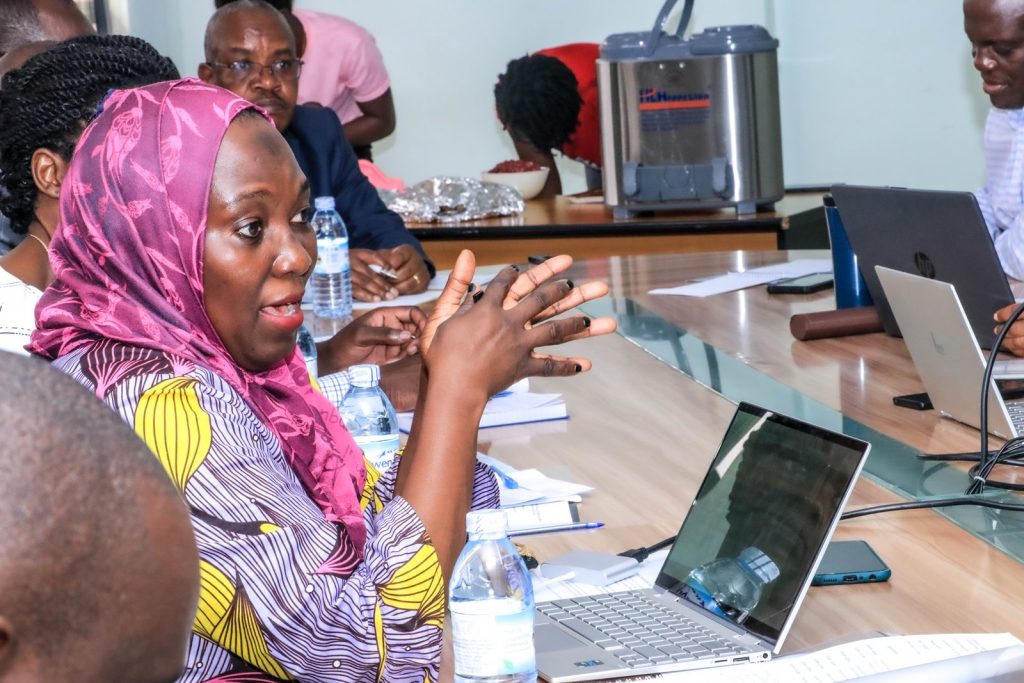
She further stresses that mental health conditions impact individuals throughout their lifespan, affecting quality of life. This includes early childhood, adolescence, pregnancy, adulthood, as well as specific groups such as men in uniform, workplace populations, and the elderly who are at an increased risk for mental illnesses.
Uganda, according to Dr. Hafsa invested USD 25m in 2009 to improve mental health facilities and provide training for health workers, with support from the African Development Bank.
“We have set up several health facilities and trained numerous health workers with the support of the African Development Bank,” says Dr. Hafsa. “However, there have been no studies to assess the impact of these investments. Routine data from the Ministry of Health Management Information Systems (HMIS) indicates an increase in new patients treated for mental health conditions.”
She adds that improvements have been made to the structure of mental health care at all levels to increase the number and mix of mental health professionals.
Despite progress, as noted in the 2018 report of the Sectoral Committee on Health, Uganda still grapples with a significant mental health treatment gap of 85%, leaving only 15% of those in need with access to care. Primary healthcare facilities often refer individuals to higher-level tertiary care, and mental health stigma persists, with limited awareness among the general population, as highlighted by the World Bank.
To bridge the gap, WHO suggests integrating mental health services into PHC systems in countries like Uganda. However, challenges such as prioritization, poverty, cultural differences, health system issues, medication supply, workforce shortages, and inflexibility pose barriers to this integration.
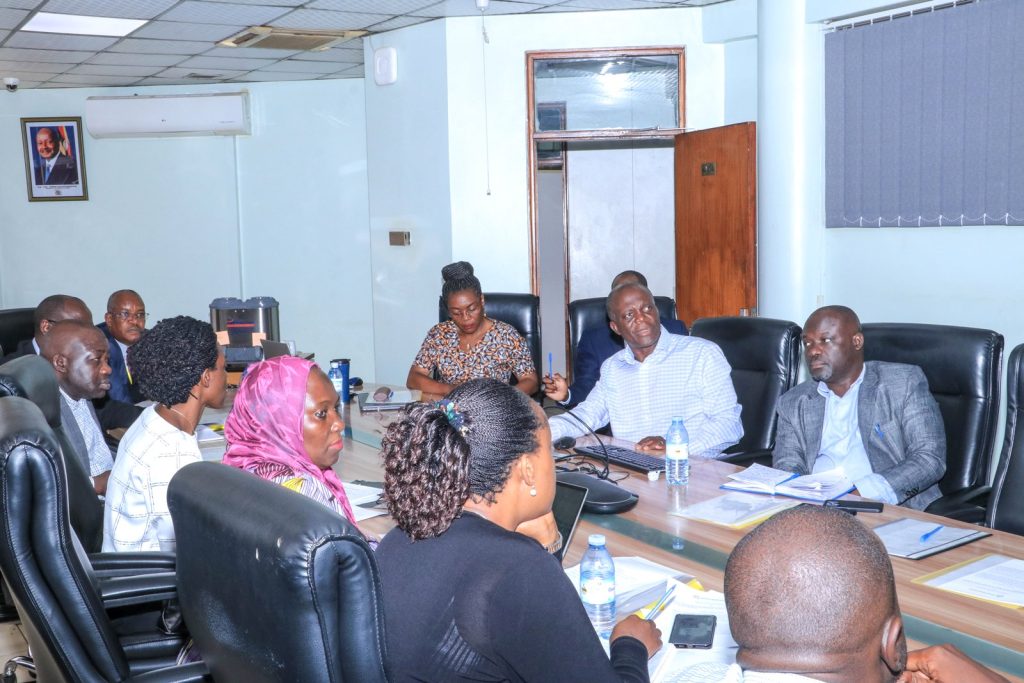
Dr. Nakku acknowledges that mental health has received policy priority in Uganda, but gaps remain in delivering services at primary care, community, and school levels, leaving some populations underserved.
“Mental health problems are risk factors for various public health concerns, such as road traffic accidents and injuries. The role of alcohol and substance use in these issues is significant. Integrating mental health into primary health care may be a cost-effective solution with desirable treatment outcomes. There have been efforts to integration. We now want to assess the extent of integration into PHC, communities and schools in Uganda,” explained Dr. Nakku.
The study aims to evaluate the Knowledge, Attitudes, and Practices (KAP) related to mental health care/services among a total of 1380 individuals, including 45 students/pupils from each of the 33 schools. The assessment will focus on both teachers, learners’ senior women teachers, school nurses and matrons.
Dr. Fredrick E. Makumbi, an Associate Professor of Biostatistics at MakSPH outlined how the study will use qualitative and quantitative data to comprehensively understand mental health integration in Uganda. He provided specifics on the quantitative component, including the study population, sample size, sampling procedure, and data analysis plans. He stressed that the collected data will yield indicators for developing a composite measure of integration, stratified by primary healthcare, communities, and schools.
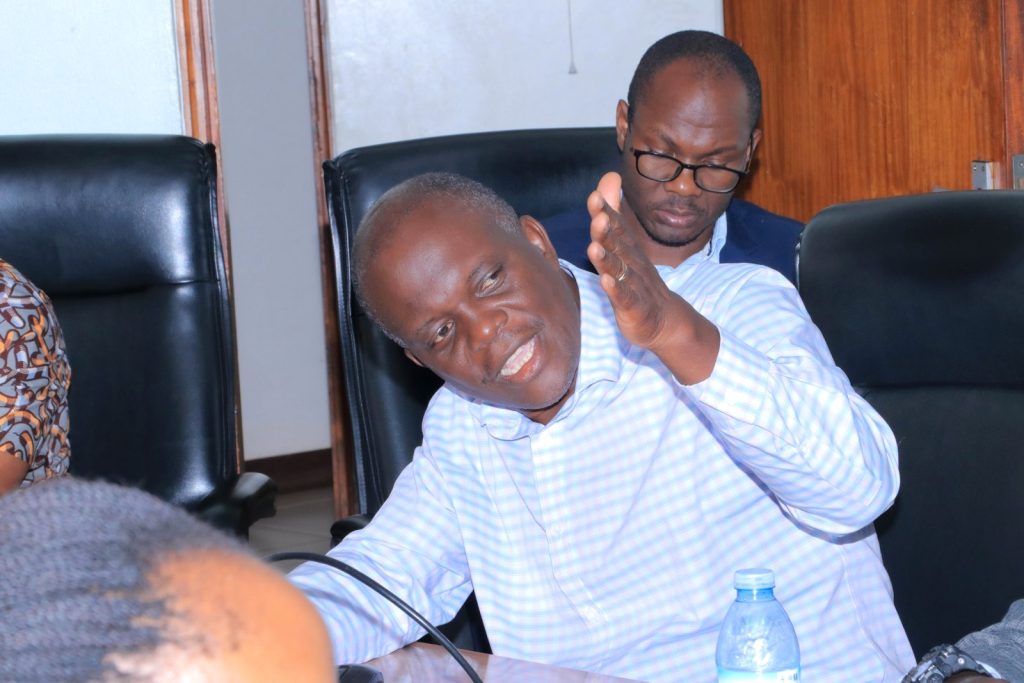
“This study is quite interesting because we have primary health care units as a study population. We shall randomly pick study participants from the villages and schools served by the health care units. We also have plans to construct an Integration of Mental Health Services/Care Composite (IMHC) based on scores from the items/indicators of integration at each of the 3 levels. Each indicator present will be scored ‘1’ else ‘0’, and a total score will be obtained as the sum of all individual indicator scores. The proportion of schools/communities/PHC facilities generated will be based on an agreed cut-off,” explained Dr. Fred Makumbi, a Co-Principal Investigator of the MHISU study.
Professor Rhoda Wanyenze, the Dean and study Advisory team member expressed her enthusiasm for hosting a study highlighting that mental health was “an integral part of our lives.” Accordingly, she stressed MakSPH’s commitment to increasing mental health knowledge through research and expressed her delight in partnering with Butabika Hospital, citing their history of effective teamwork. “The School of Public Health will document the learnings from this study and this study is not a one-off.”

Dr. Wilson Winstons Muhwezi, an Associate Professor in the Department of Psychiatry at Makerere University College of Health Sciences, provided insights on the qualitative component of the study during the discussion. He emphasized the purpose of describing and providing context for integration, and how the study team aims to explain trends, relationships, consistencies, and inconsistencies through the numerous question items they have put together.
“We think if we are able to go to very many sub-populations that we have marked out for purposes of collecting this qualitative data, we shall be able to provide context and meaning according to the data sources themselves so that we have better appreciation of what is going on,” says Dr. Muhwezi.
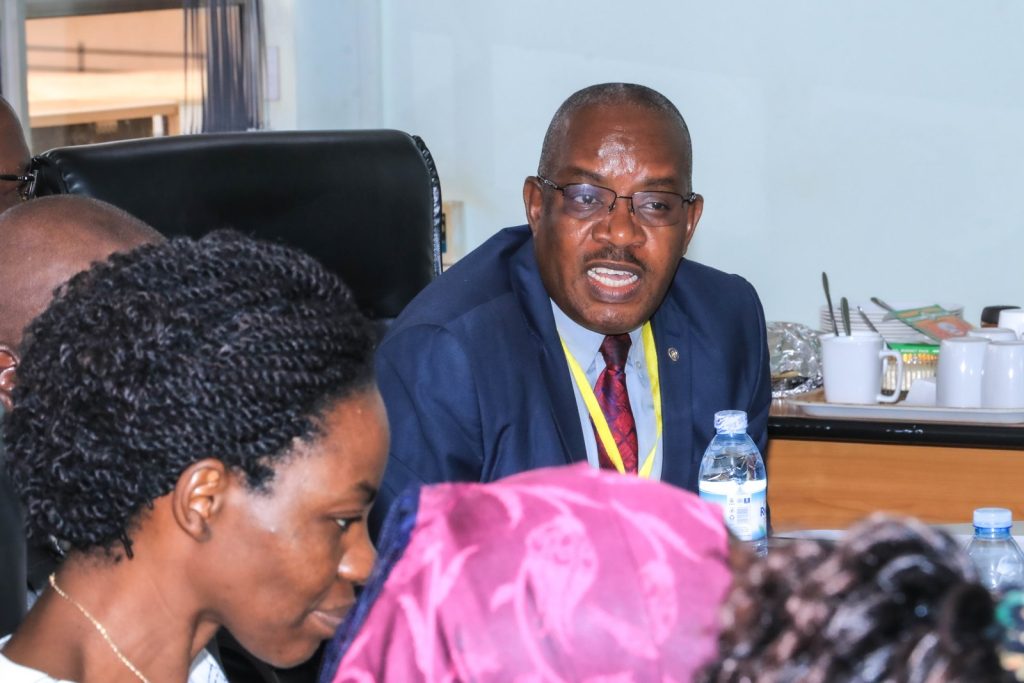
Dr. Muhwezi expressed excitement to be part of a study that recognizes the value of qualitative data in increasing the wealth of knowledge. “As far as I am concerned, I am very excited about this study because rarely do we get to do studies where the qualitative approach is given prominence like the quantitative approach. I think we will get good information when we come from the field.”
Dr. Oyoo Charles Akiya, the Commissioner NCDs-Ministry of Health, expressed the Ministry’s keen interest in the upcoming study on Ugandan mental health during an inception meeting chaired on their behalf. He emphasized that understanding the mental health needs of Uganda will lead to better interventions and contribute to achieving Sustainable Development Goal 3 – Good Health and Well-being.
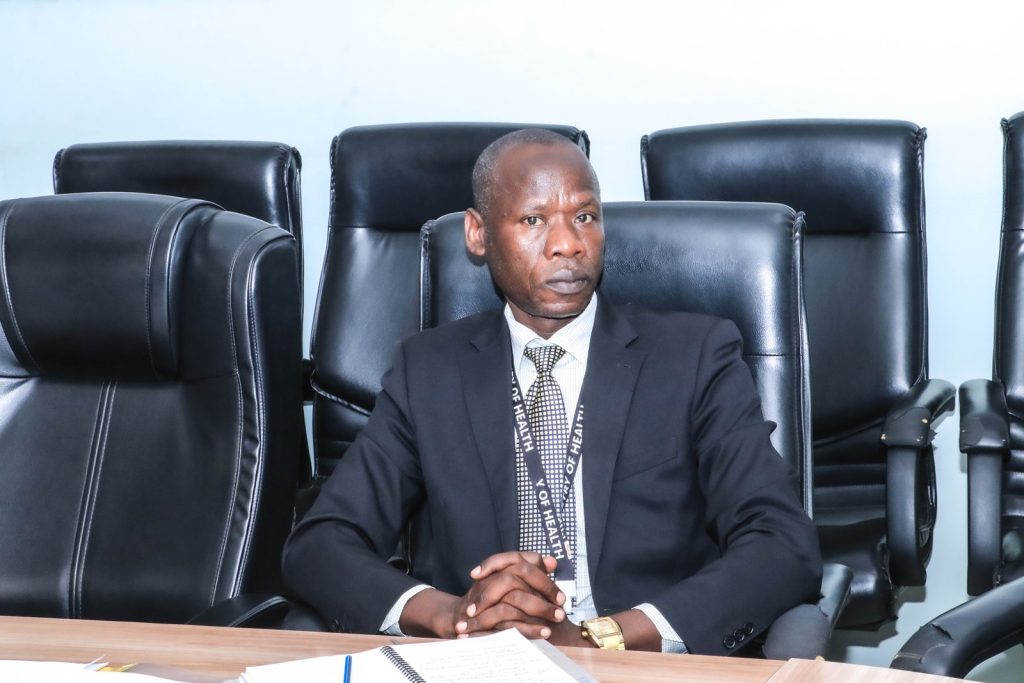
According to Dr. Oyoo, Ministry of Health will support the study team and that it was eager to learn more about the study and how they can be of service. He expressed gratitude to the World Bank, MakSPH, and Butabika Hospital for their contribution to improving mental health care in Uganda.
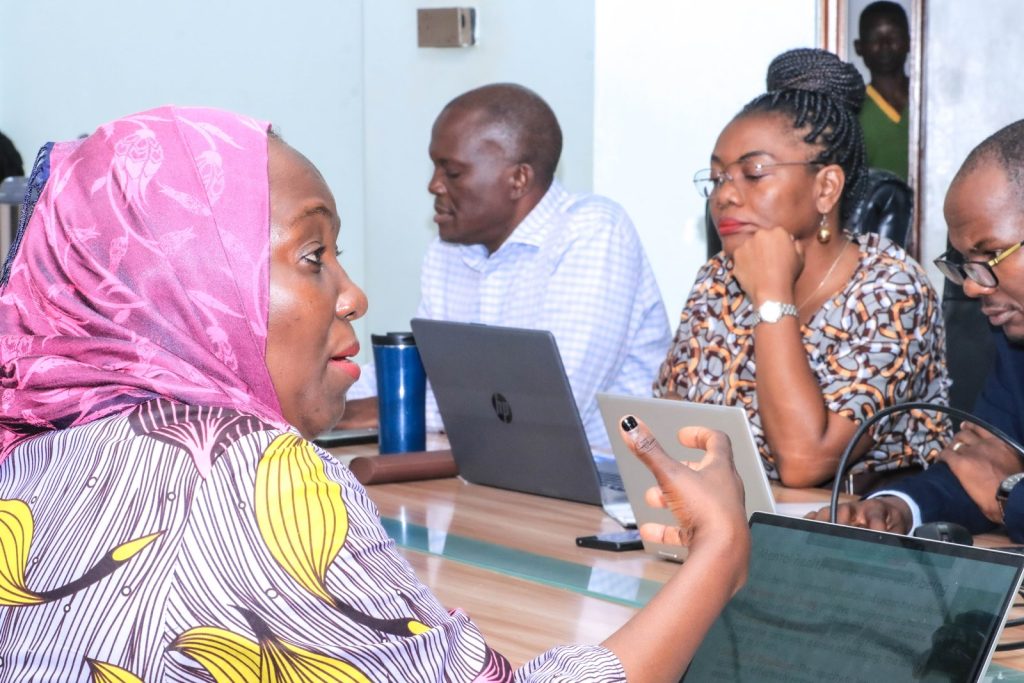
You may like
-


Call for Applications: Diploma Holders under Government Sponsorship 2026/2027
-


Makerere Graduation Underscores Investment in Africa’s Public Health Capacity
-


Botswana Delegation Visits Makerere’s Public Investment Management Centre to Study Sustainable Training Model
-


Three MakSPH Faculty Honoured with Makerere University Research Excellence Awards 2026
-


Makerere University commemorates 13 transformative years of partnership with Mastercard Foundation
-


200 UVTAB students graduate: CEES emphasizes Skills, Integrity and Community Impact
Health
Makerere Graduation Underscores Investment in Africa’s Public Health Capacity
Published
1 day agoon
March 4, 2026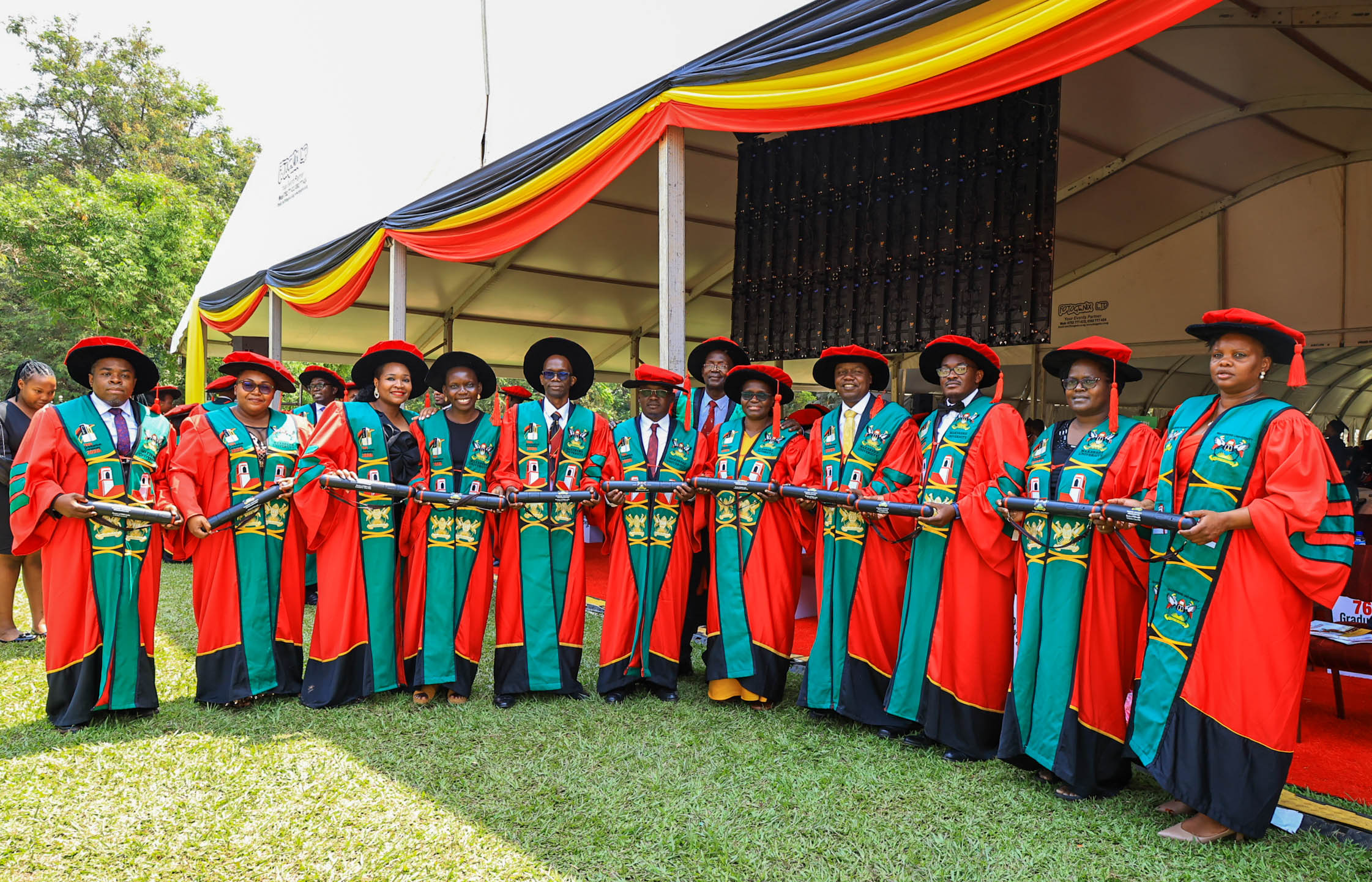
KAMPALA, 25 February 2026 — Higher education must move beyond awarding degrees to producing solutions for national and global crises, speakers said on Wednesday as Makerere University continued its 76th Graduation Ceremony, positioning universities as central actors in strengthening Africa’s public health capacity.
Addressing graduands on Wednesday, February 25, 2026, at Freedom Square, national leaders and university officials framed graduation not as a ceremonial endpoint but as an investment in workforce readiness, research leadership, and evidence-driven governance, particularly at a time when health systems across the continent face growing pressure from pandemics, demographic change, and climate-related risks.
The message resonated strongly through presentations from Makerere University School of Public Health (MakSPH) and Makerere University College of Health Sciences (MakCHS), whose graduates enter professional service amid renewed global attention to health system resilience, scientific leadership, and locally generated research.
Delivering the commencement address on Day Two of Makerere University’s 76th Graduation Ceremony, Dr. Margaret Blick Kigozi, Board Chairperson of the Makerere University Endowment Fund, reflected on her graduation in 1976 during a period of national uncertainty under then-Chancellor President Idi Amin. She recalled leaving Uganda soon after with her young family, carrying “little more than education, values, and hope,” an experience she used to frame lessons on resilience, purpose, and responsibility in uncertain times.
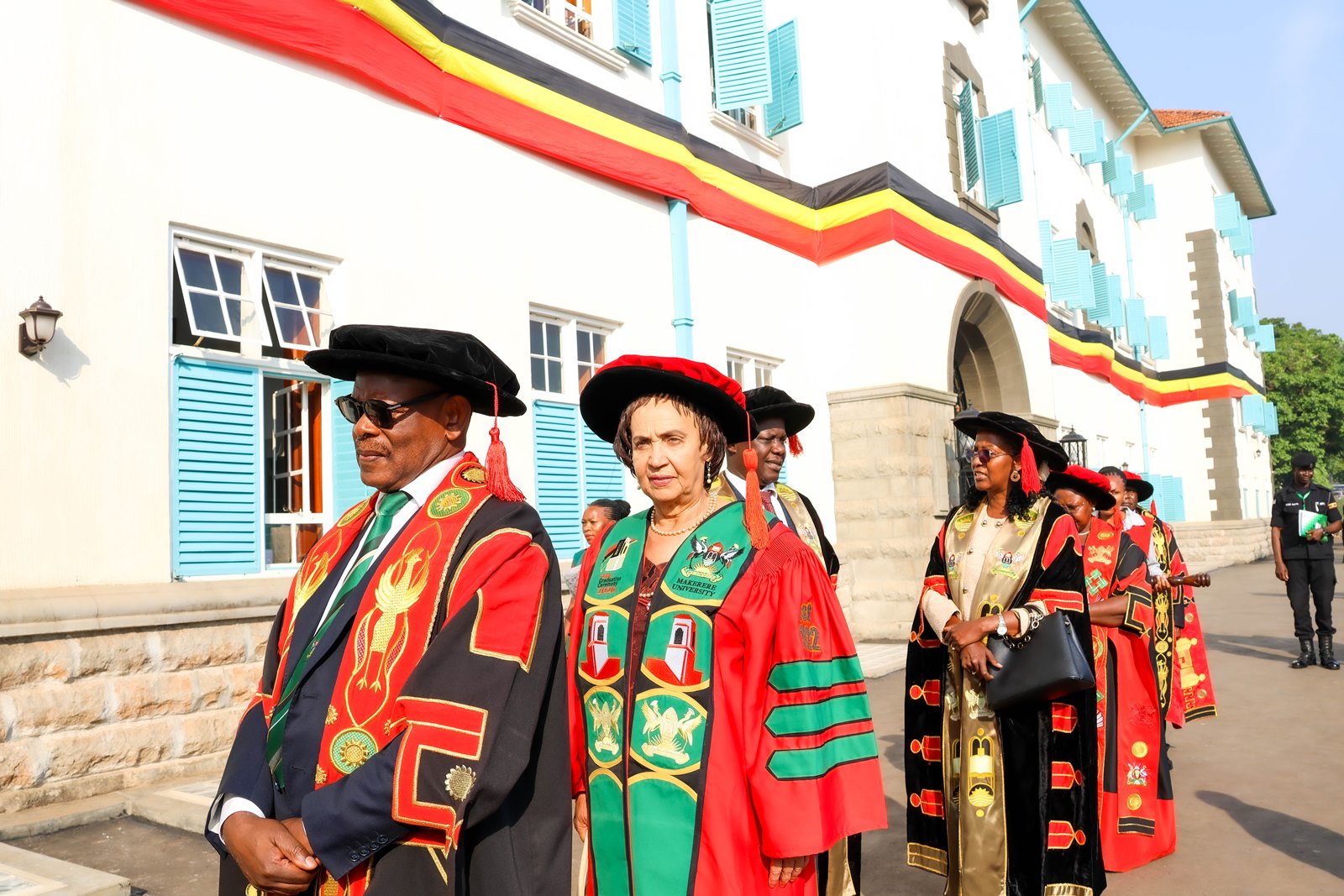
Challenging graduates to rethink professional success, she reminded those entering health and life sciences that their training carries extraordinary influence.
“Power does not make you important; it makes you responsible,” she said. “You will decide who is listened to and who is dismissed, who waits and who is rushed through, who feels safe and who feels small. Your education has trained you to ask better questions, but your humanity must guide the answers. Behind every chart, every case, every experiment, there is life, and life deserves care, patience, and dignity.”
Throughout the ceremony, speakers returned to a common refrain: societies increasingly depend on evidence, and universities must produce professionals capable of translating knowledge into policy, practice, and community impact.
Across the four-day congregation, the University will award 9,295 degrees and diplomas, including 2,503 Master’s degrees, 6,343 Bachelor’s degrees, 206 Postgraduate Diplomas, and 30 Diplomas. But beyond the numbers, speakers repeatedly returned to a central question on how higher education can translate academic growth into national development and health security.
On day two, graduands were presented from the College of Natural Sciences, the College of Veterinary Medicine, Animal Resources and Biosecurity, the College of Health Sciences, and the MakSPH, the latter positioned squarely within Africa’s ongoing struggle to expand its pool of trained epidemiologists, health systems researchers, and policy leaders.
Vice Chancellor Prof. Barnabas Nawangwe noted that Africa averages just 80 researchers per million people, compared to a global average of 1,081, warning that the human resource gap remains substantial.
“Today the School of Public Health presents graduands joining the field at a time when Africa faces a critical shortage of highly trained public health leaders,” he said.
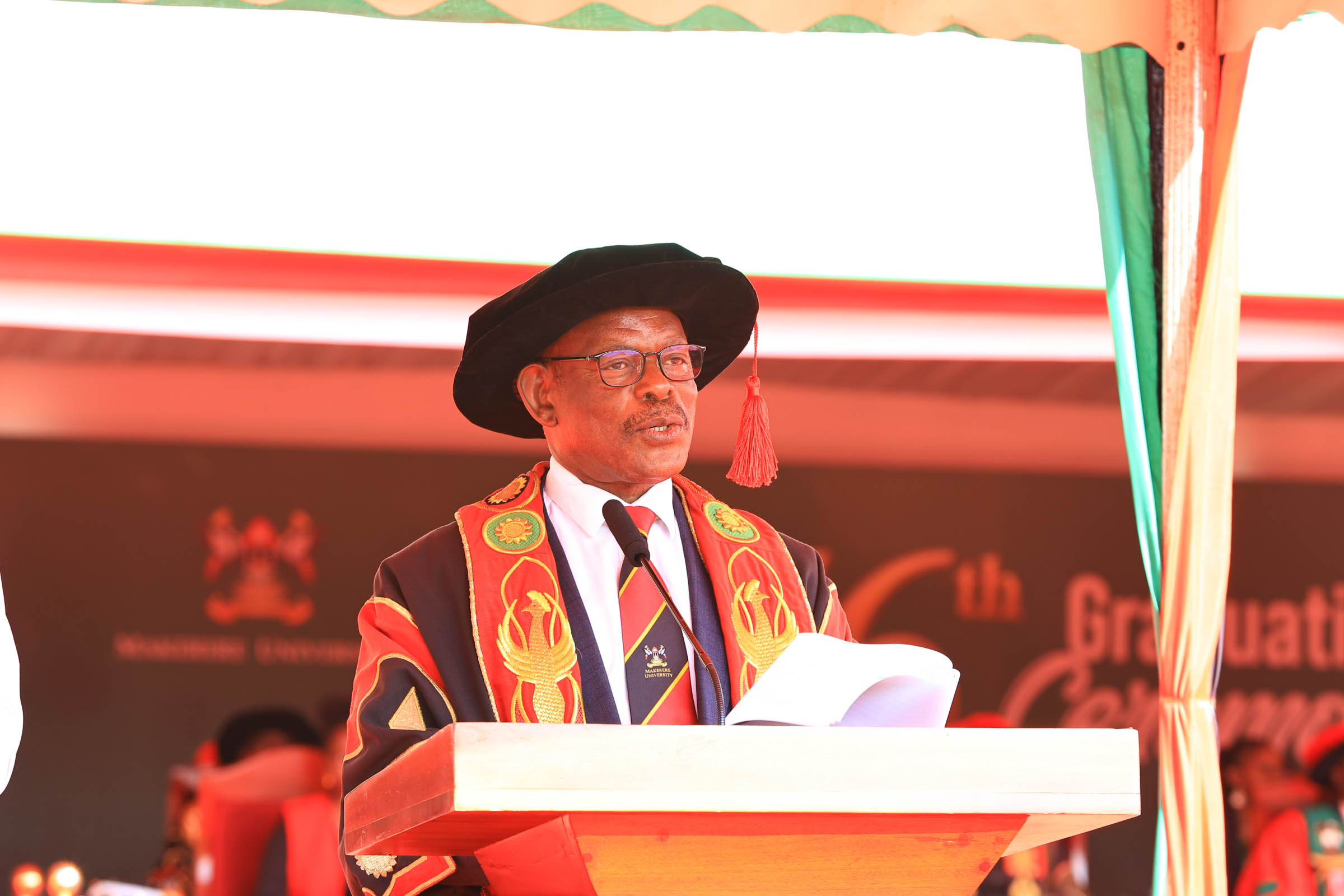
The School of Public Health presented seven PhD candidates: Aber Harriet Odonga, Komakech Henry, Lubogo David, Nakisita Olivia, Namukose Samalie, Ntaro Moses, and Osuret Jimmy. It also graduated 195 Master’s students and 29 Bachelor of Environmental Health Science graduates, including four first-class honours recipients led by Phillip Acaye with a CGPA of 4.63.
Their research spans maternal and child health, epidemic preparedness, sanitation behaviour change, nutrition systems integration, and injury prevention, areas increasingly recognised as foundational to national development rather than peripheral health concerns.
University Chancellor Dr. Crispus Kiyonga emphasized that research must move beyond academic publication into policy and implementation.
“Research plays a very vital role in the development of any community,” he said, linking university scholarship directly to Uganda’s national development agenda.

For public health education, that responsibility carries particular urgency. The COVID-19 pandemic, recurring disease outbreaks, and climate-linked health risks have exposed how deeply national stability depends on scientific capacity.
The chancellor hailed the Government of Uganda for committing UGX 30 billion through the Makerere University Research and Innovations Fund (MakRIF).
Mak Urged on More PhDs
Representing the First Lady and Minister of Education and Sports, State Minister Dr. Joyce Kaducu Moriku described doctoral training as central to Uganda’s research ambitions, noting government efforts to expand funding and modernize higher education systems.
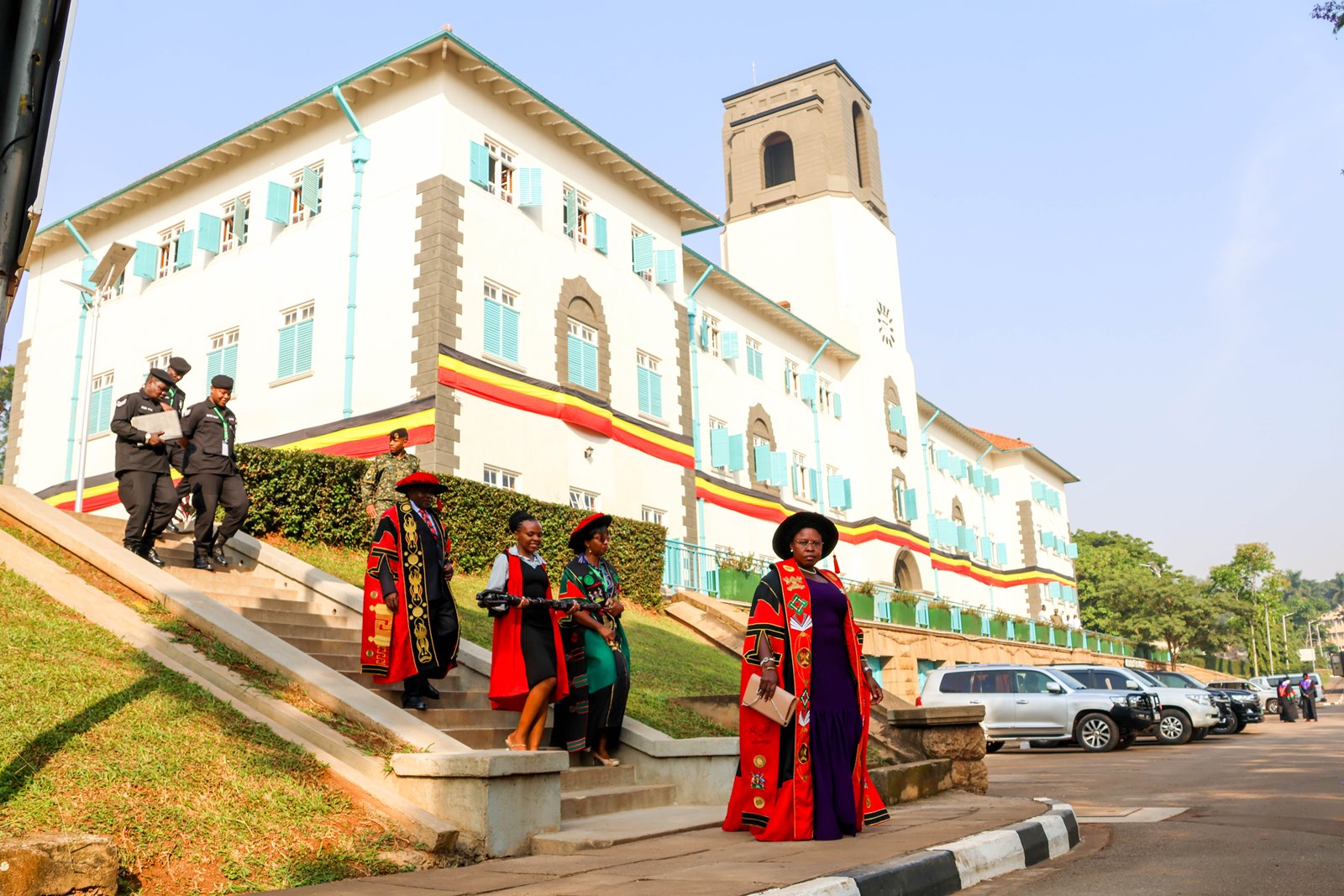
“Universities must produce more PhDs to strengthen the national research agenda,” she said, adding that competence-based reforms aim to align training more closely with societal needs.
“More PhDs also mean the university is growing in academic leadership and an increase in research. So, keep the numbers growing, especially in Science, Technology, and Engineering,” she added.
The 213 PhDs conferred this year, a record, signal more than institutional expansion but a response to structural deficits.
Africa bears approximately 25% of the global disease burden but produces a disproportionately small share of global health research. The continent’s research density remains far below global averages. In this context, each doctoral graduate becomes not merely an academic achievement but a strategic asset.
A University Responding to Its Moment
For the School of Public Health, the graduation reflects a broader evolution in how public health training is conceived. Rather than focusing solely on the treatment of disease, the field increasingly addresses systems, sanitation, nutrition, behavioural change, surveillance, prevention, and climate change, areas where research directly shapes everyday life.
Recent MakSPH-led initiatives, including national HIV impact surveys and digital health system expansion, demonstrate how academic institutions increasingly function as implementation partners to the government rather than observers.
Over the past five years, MakSPH has supported the national scale-up of electronic medical records through the CDC-funded Monitoring and Evaluation Technical Support (MakSPH-METs) programme, and led the Third Uganda Population-Based HIV Impact Assessment (UPHIA 2024–2025), the first fully Ugandan-implemented national survey of its kind.
Launched in 2020, the METs program has supported the nationwide scale-up of UgandaEMR+, transitioning thousands of facilities to secure electronic medical records and deploying critical ICT infrastructure. In March 2026, these systems will be formally transitioned to the Ministry of Health, reflecting sustainable national ownership.
Health
Three MakSPH Faculty Honoured with Makerere University Research Excellence Awards 2026
Published
3 days agoon
March 2, 2026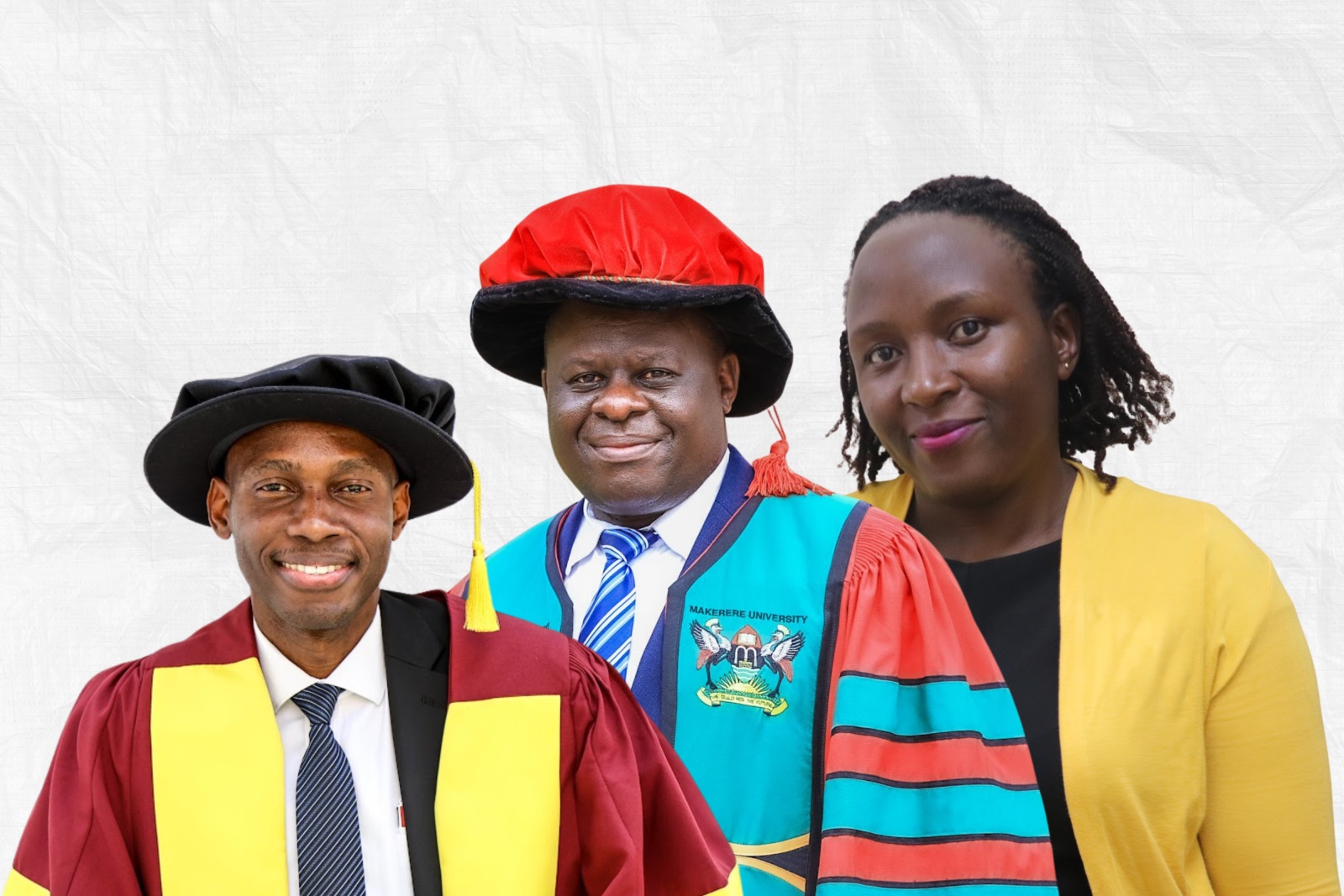
KAMPALA—Three faculty members from Makerere University School of Public Health (MakSPH) have been recognised at the Makerere University Vice-Chancellor’s Research Excellence Awards 2026, highlighting the School’s expanding contribution to research leadership, scientific productivity, and policy-relevant scholarship across Africa.
Associate Professor Peter Kyobe Waiswa, Associate Professor David Musoke, and Juliana Namutundu received honours during the University’s 76th Graduation Ceremony at Freedom Square, where Makerere celebrated scholars whose work has demonstrated exceptional research achievement and impact beyond academia.

The annual awards, coordinated by the Directorate of Research, Innovation and Partnerships (DRIP), recognise faculty and staff whose scholarly output and leadership advance Makerere University’s ambition to become a research-led institution.
“This recognition celebrates sustained excellence in research productivity and contributions to knowledge that advance both national and global discourse,” Vice-Chancellor Prof. Barnabas Nawangwe said. “We are strengthening a culture where research does not remain confined to journals but translates into solutions for society.”
Among the university’s top researchers was Assoc. Prof. Peter Kyobe Waiswa, a health systems scientist whose work focuses on maternal, newborn, and child health. Waiswa ranked among Makerere’s overall top researchers after publishing 43 peer-reviewed papers in 2025, tying with three-time award winner Prof. Moses Kamya of the School of Medicine in the College of Health Sciences.
His research examines how health systems function at their most fragile moments, including childbirth, early life, and community-level care, addressing questions of equity, service delivery, and health system performance across Africa.
Also recognised was Dr. David Musoke, an Associate Professor of Disease Control, whose 25 publications earned distinction among senior career researchers. His work spans environmental health, community health systems, and implementation research, areas increasingly viewed as critical to preventing disease before it reaches hospitals.
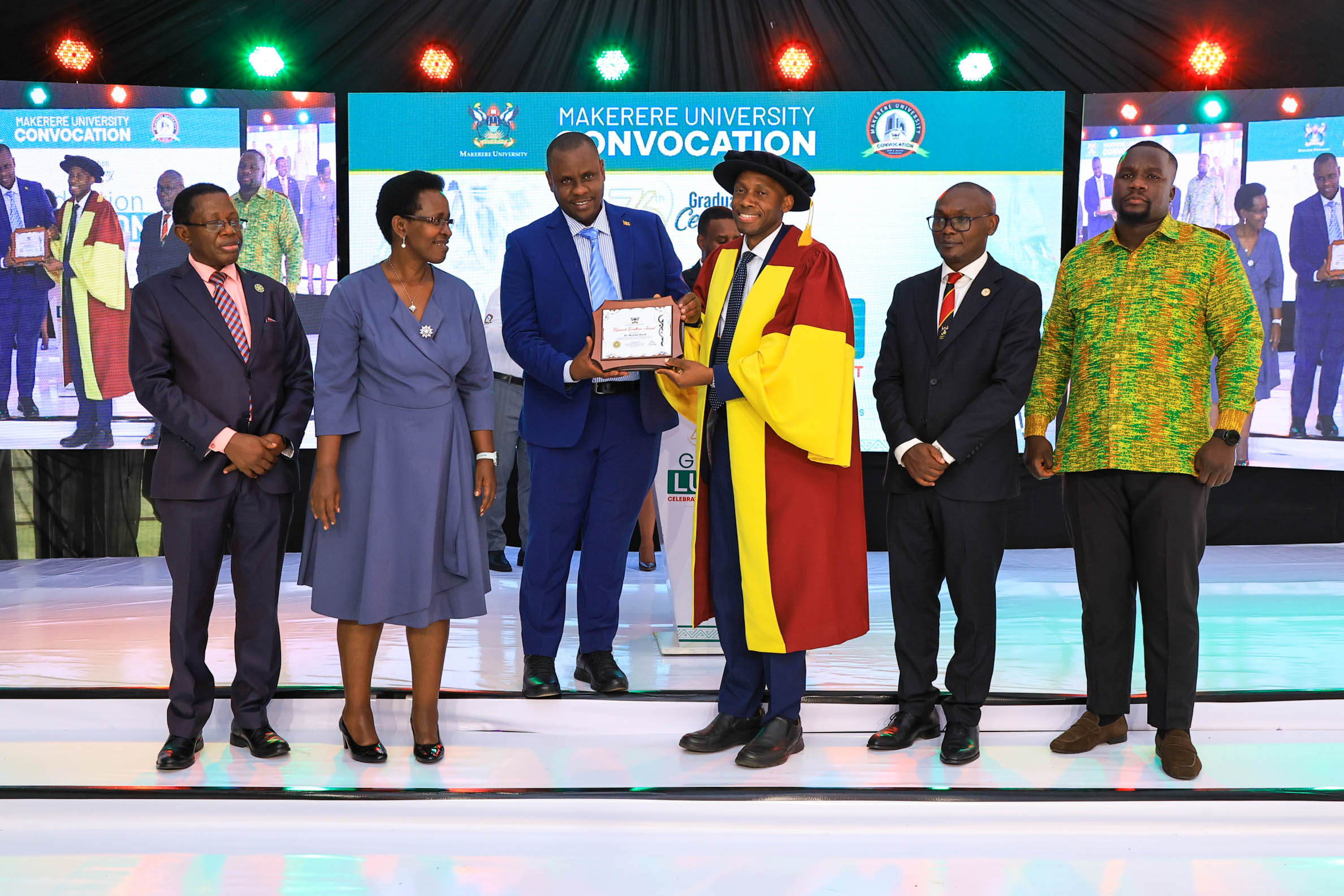
In the early-career category, Juliana Namutundu received recognition for emerging research leadership, reflecting Makerere’s effort to nurture the next generation of African scholars.
Together, the awards underscored MakSPH’s growing influence within Makerere’s research ecosystem, particularly in fields linking science directly to population wellbeing.
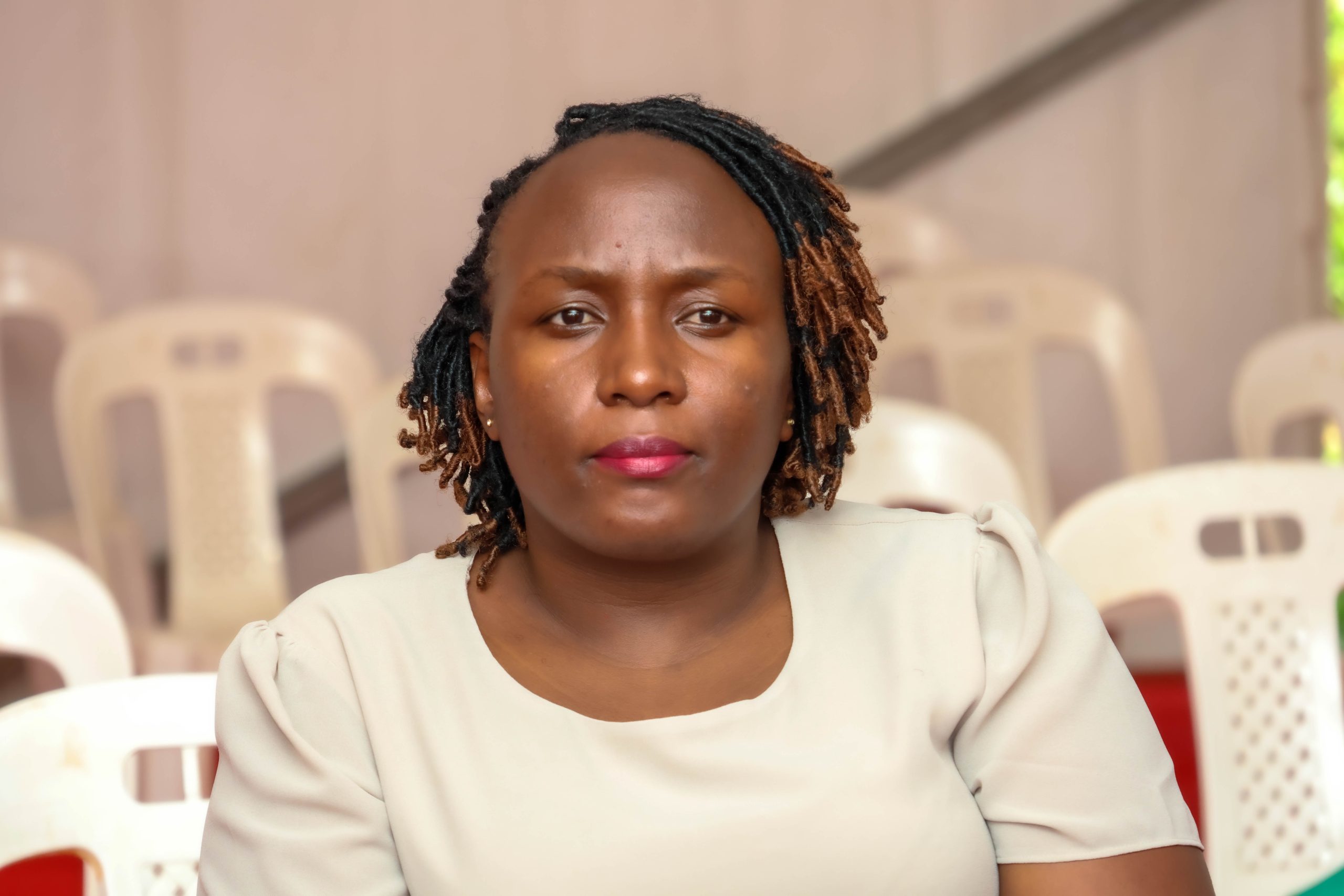
The Research Excellence Awards were established to encourage publication in high-impact journals while reinforcing Makerere’s ambition to become a globally competitive research university. Nominations are reviewed by the Board of Research and Graduate Training, chaired by Deputy Vice-Chancellor (Academic Affairs) Prof. Sarah Ssali.
Awardees were honoured during a graduation luncheon organised by the Makerere University Convocation, the institution’s alumni and staff association, which described the event as a celebration of “excellence and inspiring impact.”
The ceremony also recognised forms of scholarship extending beyond traditional academic publishing.
Dr. Geofrey Musinguzi, a research associate at the School of Public Health, was honoured for his book My Journey with Rectal Cancer, an account of diagnosis, treatment, and recovery that blends personal testimony with public health advocacy.
Diagnosed at age 44 while a visiting scholar at the University of Antwerp in Belgium, Musinguzi sought medical care after experiencing persistent symptoms, including rectal bleeding and back pain. His treatment involved surgeries, chemotherapy, radiotherapy, and a year living with a colostomy bag.
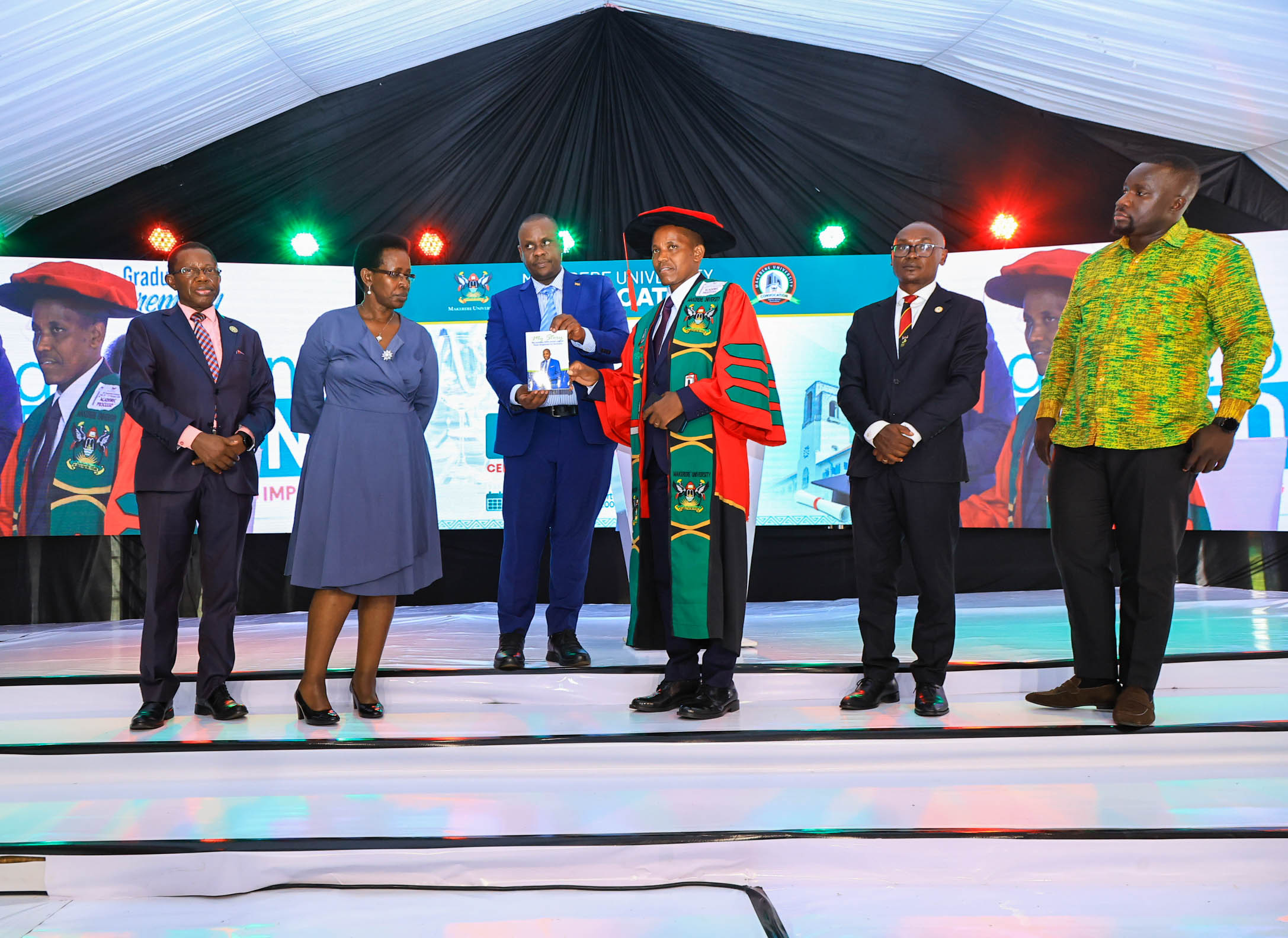
Rather than keeping the experience private, he documented it publicly to challenge cancer stigma and encourage early screening. The book, launched at the School of Public Health in August 2024, highlights how lived experience can shape public health awareness alongside scientific research.
The recognition reflects a broader understanding of research impact, one that includes scholarship capable of influencing behaviour as well as policy.
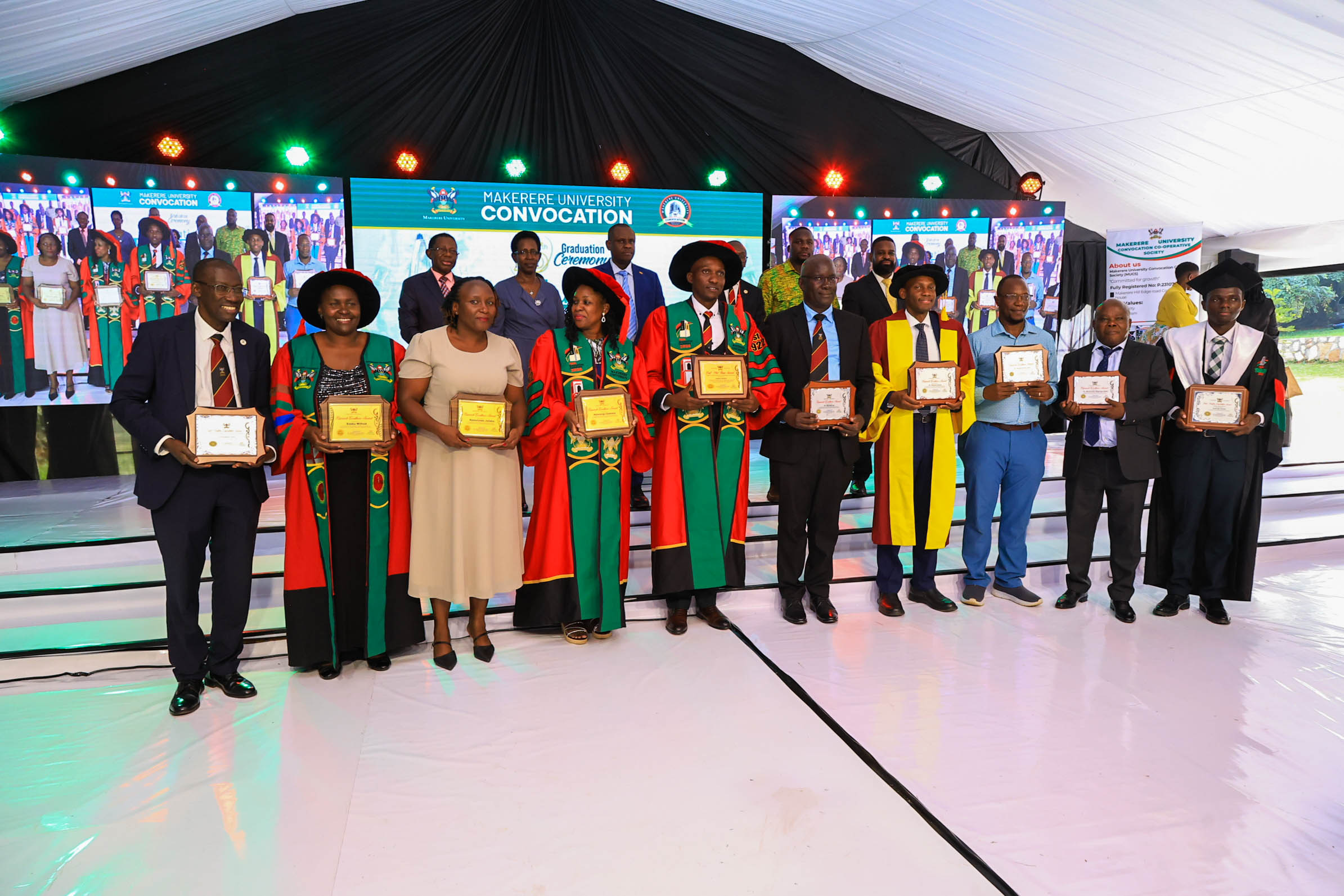
Makerere’s emphasis on research excellence comes as African universities face increasing pressure to produce locally grounded evidence while competing globally for visibility and funding. For MakSPH, whose work spans disease surveillance, environmental health, and health systems research, publication output increasingly serves as both academic currency and development infrastructure.
“These awards are part of our broader effort to position Makerere as a truly research-led institution,” Nawangwe said, adding that scholarship must remain aligned with national and regional priorities.
Health
Makerere’s 76th Graduation Ceremony: CHS showcases research strength with 26 PhD Graduates
Published
7 days agoon
February 26, 2026By
Zaam Ssali
The second day of the Makerere University 76th Graduation Ceremony, held on Wednesday 25th February, marked another proud moment as the institution continues its tradition of academic excellence and national service. Graduands were presented for conferment of degrees and award of diplomas from the College of Health Sciences (CHS), College of Natural Sciences, College of Veterinary Medicine, Animal Resources and Biosecurity and School of Public Health.
The College of Health Sciences presented a total of 746 graduands for conferment of degrees including 26 PhD, 293 Masters, 425 Bachelors and 2 Diplomas. This is a testament to CHS and Makerere University’s contribution in training skilled health professionals and strengthening Uganda’s health systems through education, innovation and research.
Speaking to the congregation, Professor Barnabas Nawangwe – Vice Chancellor, Makerere University welcomed everyone to Day 2 of Makerere University’s 76th Graduation. He congratulated the 9,295 graduands comprising 4,262 (46%) female graduates and 5,033 (54%) male graduands who will be awarded degrees and diplomas through the graduation week; 213 graduands are PhD recipients. He commended the efforts of staff, parents, and sponsors in supporting the students’ journeys.
He reminded the congregation that outstanding researchers were honored on Day 1 of the graduation for excellence in scholarly work and impactful publications, reaffirming the University’ commitment to research productivity and academic distinction. In addition, the Innovation Commercialization Award was also presented, highlighting Makerere’s focus on turning research into practical solutions that address real-world challenges and drive national development.
The Vice Chancellor highlighted the history of the College established in 1924 cognizant of its impact on Uganda’s Health sector and beyond. He said, ‘As the College enters its second century, it is strengthening specialist training to address increasingly complex health challenges’. CHS has introduced fellowship programmes to equip physicians with advanced expertise which are useful in transforming health systems across Uganda and the region. In 2025 alone, 16 fellows graduated in Pediatric Hematology and Oncology, with additional fellowships underway in Newborn Health, Interventional Radiology, Emergency Care Medicine, and Pulmonary and Critical Care Medicine.
Professor Nawangwe also noted the progression of one of the centres of excellence at CHS, the Makerere University Lung Institute (MLI) established a decade ago to address the growing burden of lung disease in Uganda. He said, ‘today, the MLI serves 6,000 patients annually, shapes national policy and has embarked on construction of a new building, signalling a renewed commitment to advancing respiratory health in Uganda and beyond’.
He also reminded the congregation that CHS continues its centennial celebrations, including the upcoming Alumni Dinner Gala on March 6th 2026 to raise funds for refurbishing the iconic Davis Lecture Theatre, culminating in the unveiling of a Centennial Monument later this year.
Professor Nawangwe applauded the steady advancement of Makerere University into a research-led institution, generating knowledge that drives communities, strengthens industries, and advances national transformation.
Professor Maggie Kigozi was the commencement speaker for Day 2. Professor Kigozi, a distinguished alumna reflected on how her time at Makerere University shaped her life, career, and values, recalling her graduation in 1976 during a period of national uncertainty. Forced to leave Uganda soon after with little more than her education and determination, she noted that her Makerere training opened doors across the region, enabling her to serve in leading health institutions in Zambia, Kenya, and Uganda. Addressing the graduands, she emphasized that their Makerere education remains a powerful passport to opportunity and carries with it the responsibility to uphold excellence and integrity wherever they serve.
She urged graduates in the health and life sciences to handle the power of their profession with humility, compassion, and responsibility, reminding them that behind every patient, case, or experiment lies a life deserving dignity. Beyond clinical expertise, she encouraged them to develop business and financial skills to build sustainable health services and create opportunities for others. She also reassured them that failure is part of growth, noting that resilience, continuous learning, and balance in life are essential to meaningful success as they step forward as ambassadors of the Makerere legacy.
Delivering a speech on behalf of the First Lady and Minister of Education and Sports, Janet Kataha Museveni, the State Minister for Primary Education, Hon. Dr. Joyce Moriku Kaducu, said the Government had deliberately deepened investment in higher education to position universities as drivers of national development.
Hon. Kaducu described the establishment of the Makerere University Research and Innovation Fund (RIF) as a major milestone, noting that it supports high-impact research aligned to national priorities and has enabled thousands of researchers to deliver practical solutions benefiting communities across Uganda. She also highlighted Parliament’s approval of a 162 million US dollar concessional loan from the Korea EXIM Bank to upgrade science, technology and innovation infrastructure at Makerere University, including modern laboratories, smart classrooms and advanced facilities for engineering and health sciences, to better prepare students for the Fourth Industrial Revolution.
The Minister announced plans to construct a national stadium at Makerere and other higher education institutions to promote sports development and talent identification. She reiterated the directive for all universities to fully implement Competence-Based Education and Training by July 2027, urging Makerere to lead curriculum reform, staff training and infrastructure development while ensuring satellite campuses meet full accreditation and uphold academic standards, transparency and accountability.
Addressing graduates, Hon. Kaducu encouraged them to become job creators in sectors such as agriculture, infrastructure, healthcare and education, and to leverage opportunities like the Parish Development Model for entrepreneurship. She commended Makerere’s leadership and partners and congratulated the Class of 2026 on their achievement.
In his address to the congregation, Dr. Crispus Kiyonga – Chancellor, Makerere University congratulated graduands upon making it to the 76th Graduation Ceremony of Makerere University. He described their achievement as a milestone in both personal growth and national development, urging them to apply their knowledge creatively to benefit society. He acknowledged the contribution of academic staff, administrators, the University Council, and expressed gratitude to the Government of Uganda and President Yoweri Kaguta Museveni for continued support.
Dr. Kiyonga called on the university community to strengthen research, expand private sector partnerships, and leverage technology to address Uganda’s development challenges. Emphasising research as central to national progress, Dr. Kiyonga noted the Government’s UGX 30 billion investment annually in the Makerere University Research and Innovation Fund (MakRIF) and praised the Science, Technology and Innovation Secretariat, Office of the President for supporting initiatives at the University advancing homegrown solutions to national challenges. He also highlighted a strengthened partnership with the Korean government, securing a USD 162 million loan from the Korea Exim Bank to boost infrastructure and staff capacity.
While acknowledging limited formal employment opportunities, he encouraged graduates to innovate and create jobs. He further commended the university’s digitalization efforts and outlined four priorities: increased research funding, private sector collaboration, community engagement, and effective use of technology.
During the 76th graduation ceremony running from the 24th -27th February, 2026, a total of 9,295 graduands will be awarded degrees and diplomas in various disciplines. Of these, 213 will receive PhDs, 2,503 Masters Degrees, 206 postgraduate Diplomas, 6343 Bachelor’s Degrees and 30 Diplomas. 46% of the graduands are female and 54% are male.
Trending
-

 General3 hours ago
General3 hours agoCall for Applications: Diploma Holders under Government Sponsorship 2026/2027
-

 Humanities & Social Sciences1 week ago
Humanities & Social Sciences1 week agoMeet Najjuka Whitney, The Girl Who Missed Law and Found Her Voice
-

 General2 hours ago
General2 hours agoAdvert: Admissions for Diploma/Degree Holders under Private Sponsorship 2026/27
-

 General1 week ago
General1 week ago76th Graduation Highlights
-

 Agriculture & Environment2 weeks ago
Agriculture & Environment2 weeks agoUganda Martyrs Namugongo Students Turn Organic Waste into Soap in an Innovative School Project on Sustainable Waste Management
